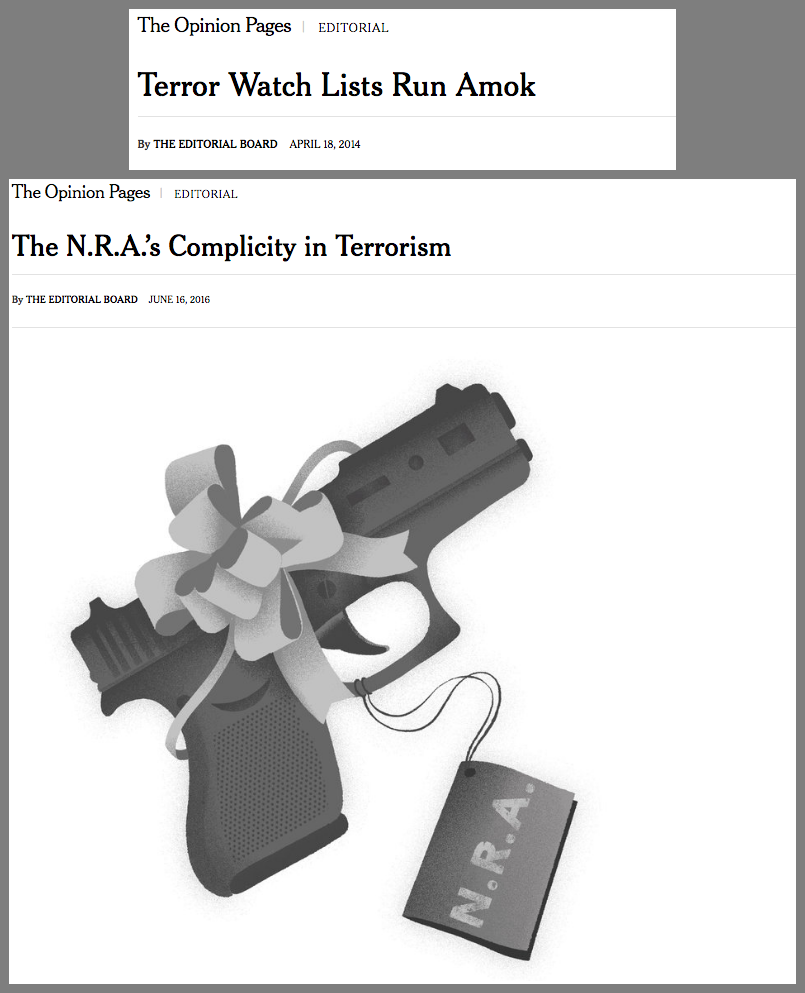The New York Times’ editorial board said Thursday that the National Rifle Association is complicit in acts of terror because it objects to legislation that would bar suspected terrorists from purchasing firearms.
But the legislation that would block certain people from buying firearms would be based on data collected under the federal government’s terrorist watch list, a secretive database established in 2003 by the Bush administration. And the Times has previously said the terror watch list has been used for extremely shady things, most notably the so-called “no-fly list.”
In 2014, for example, the paper referred to this list, which draws from the terror database, as “vastly overbroad.”

The paper recounted how a Malaysian architecture professor, Dr. Rahinah Ibrahim, found herself on the list despite having no ties to terror. The Times explained the long and arduous process that was required for Ibrahim to get herself removed from the list.
“Welcome to the shadowy, self-contradictory world of American terror watch lists, which operate under a veil of secrecy so thick that it is virtually impossible to pierce it when mistakes are made,” the board wrote.
“A 2007 audit found that more than half of the 71,000 names then on the no-fly list were wrongly included. In a recently unredacted portion of his January ruling, Judge Alsup noted that in 2009 the government added Dr. Ibrahim back to its central terrorist-screening database under a ‘secret exception’ to its own standard of proof. This would be laughable if it weren’t such a violation of basic rights. A democratic society premised on due process and open courts cannot tolerate such behavior,” the paper added.
Fast-forward a couple of years, and the Times’ tone on the government lists compiled using the terror database has changed considerably.
“If Congress is serious about the threat of terrorists using guns, there are several steps it can take right away,” the board said Thursday. It threw its full support behind “reasonable efforts to close the so-called terror gap, which would make it harder for suspected terrorists to get their hands on a gun.”
“In December, Congress considered legislation by Senator Dianne Feinstein, a Democrat, and Representative Peter King, a Republican, that would have given the F.B.I. the ability to prevent gun sales to people it had reason to believe might be connected to terrorism. The bill was based on a Bush administration proposal, and versions of it have been pushed for years, but Republicans on Capitol Hill, beholden to the National Rifle Association and other gun-rights organizations, voted it down,” the Times added.
The board’s newfound respect for a terror database-related watch lists comes days after a shooting at a gay nightclub in Orlando, Fla., claimed the lives of 49 people plus the shooter.
Objections to legislation that would block suspected terrorist from buying firearms “would be inexplicable under normal circumstances, but now that the Islamic State has openly called on lone-wolf attackers to take their war to the streets of America, it is a full-blown national-security hazard,” the Times wrote this week.
“The gun industry lobbyists may be beyond reason, but the lawmakers have a duty to respond to their constituents. Unfortunately, after each new massacre, far too many offer nothing more than condolences and moments of silence. That silence is killing us,” the board added.
